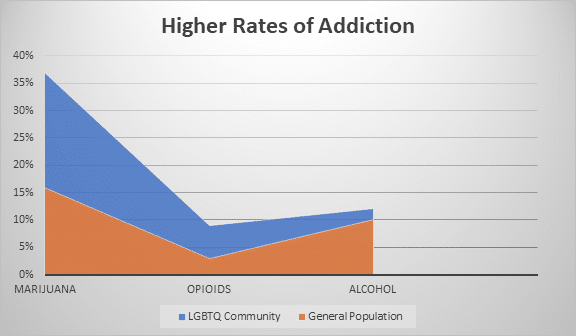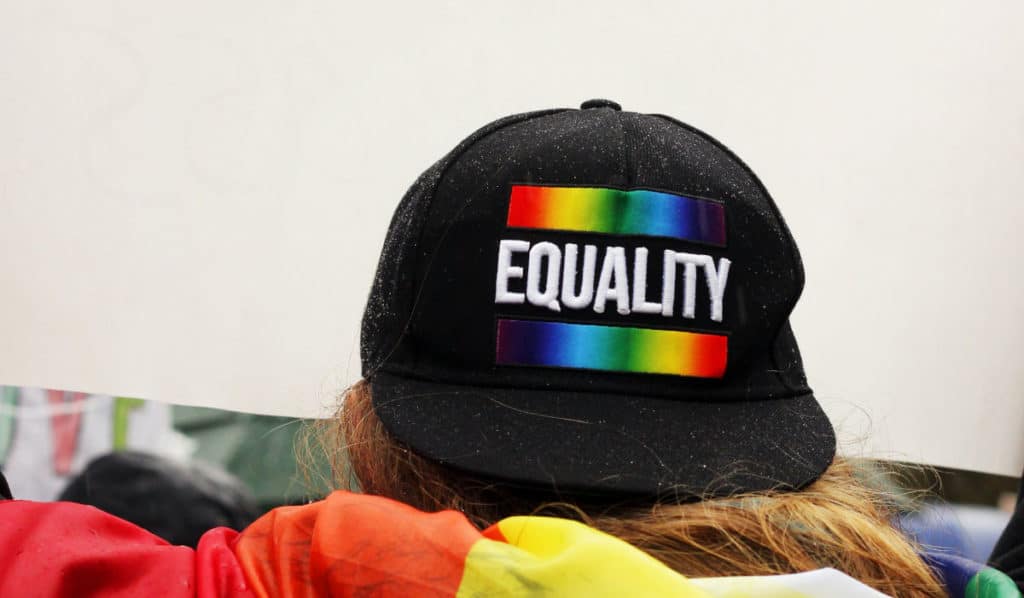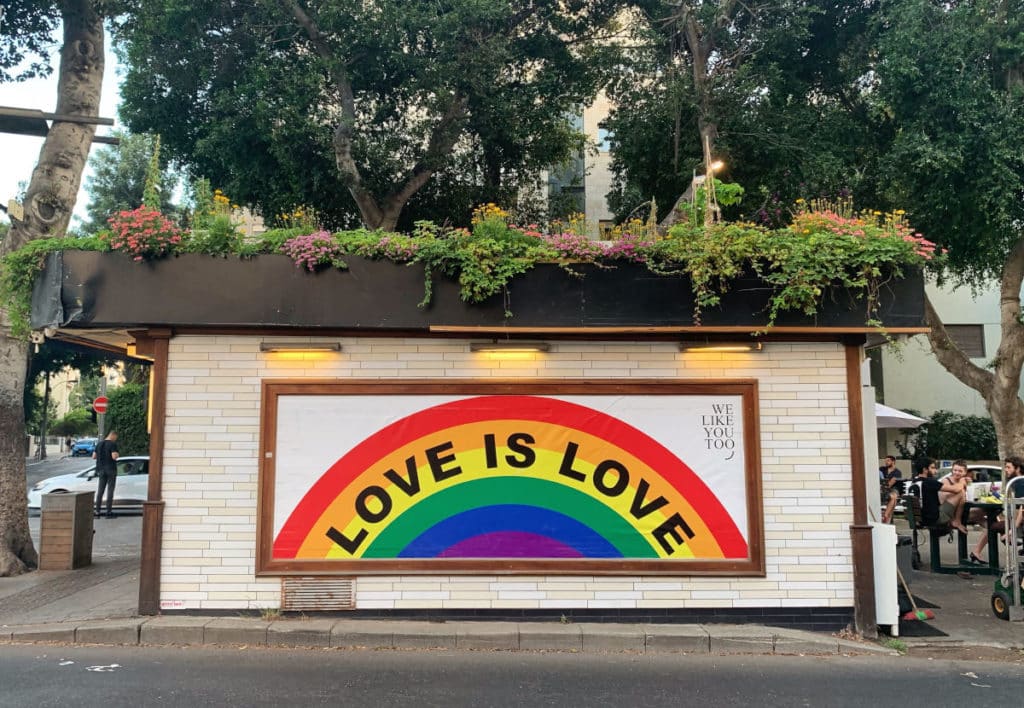Top Five Struggles of the LGBTQ Community That Lead to Addiction

Top Five Struggles of the LGBTQ Community That Lead to Addiction
Table of Contents
Addiction takes the lives of thousands of Americans each year. Although close to 21 million Americans struggle with addiction, only 10% receive the necessary help. As a result, drug–related deaths have more than tripled in the past 30 years.
Addiction is especially prevalent in the LGBTQ community. LGBTQ members are often bullied and cast out from their families. In many cases, they turn to drugs or alcohol as a mental escape from the hardships in life. Fortunately, numerous therapies exist to help LGBTQ individuals overcome addiction.
Who is in the LGBTQ Community?
The initials LGBTQ stands for Lesbian, Gay (man), Bisexual, Transgender, and Queer/Questioning.
Lesbian: A lesbian is a woman who is attracted to other women.
Gay man: A gay man is a man who is attracted to other men.
Bisexual: Bisexual refers to people who are attracted to both the same sex and the opposite sex as themselves.
Transgender: A transgender person identifies with a gender that differs from the gender they were assigned at birth.
Queer or Questioning: A person that is queer or questioning may be unsure of their sexual identity. They may be exploring their sexuality before identifying themselves with a specific term or gender.
The community can also be referred to as the LGBTQ+ community. The “+” in LGBTQ+ encapsulates any other ways of sexual or gender identification such as pansexual, asexual, nonbinary, and more. Determining one’s sexuality or gender will be a different experience for every member of the LGBTQ community.
Does the LGBTQ Community Have a Higher Rate of Addiction?

Bullying and Harassment
Bullying and harassment play a significant role in pushing members of the LGBTQ community towards drug use. Often, sexual minority adults turn to drugs and alcohol to block the pain felt from hurtful words and actions. Addictive behaviors can occur and send the individual into a downward spiral.
A 2016 study was conducted to investigate the role of school counselors, primarily in how they attended the LGBTQ community. The study found that, although sexual minority bullying was prevalent in schools, there were no specific anti-bullying interventions, state laws, or policies to address these issues.2
When children are bullied, it sets the stage for prolonged problems that can carry into adulthood. Bullying can trigger depression and anxiety, and it can lead to low self-confidence and low self-esteem. Unfortunately, these issues don’t always cease once an individual leaves the school system. Sexual minority members are often called out and ostracized by the way they live.
How Do Bullying and Harassment Lead to Addiction?
Bullying and harassment drive behaviors such as:
- Low self-esteem
- Insecurity
- Depression
- Anxiety
- Anger issues
- Hopelessness
- Resentment
- Suicidal thoughts
Instead of opening up about their problems, many choose to bottle their emotions. This is especially common in the LGBTQ community where individuals feel like there is no one they can talk to. Many choose to self-medicate instead of healthily dealing with their issues. They turn to drugs and alcohol, and such actions can bring harm to themselves and the people around them.2
The best way to help someone with an addiction is to encourage them to find treatment. Many treatment programs start with detox, so the body overcomes physical addiction, followed by customized therapeutic methods so patients overcome issues of low self-esteem and low self-worth.
Family Conflict and Rejection
Usually, one can turn to their family when they have an issue. They know their relatives will provide unconditional love and stand next to them no matter what problems they are experiencing.
However, many people in the LGBTQ community are not so lucky. They may have mothers, fathers, and other relatives who don’t understand their sexuality. Their relatives may reject them and even refuse to speak or interact with them. Not only does this increase the likelihood of addiction, but it also makes recovery more challenging.
LGBTQ adults who experienced parental conflict due to their sexuality were 3.4% times more likely to do illegal drugs as opposed to LGBTQ adults with healthy parent-child relationships. LGBTQ adults with strained family relationships were also 8.4 times more likely to attempt suicide, 5.9 times more likely to experience depression, and 3.4 times more likely to have unprotected sex.3
How Does Family Conflict and Rejection Lead to Addiction?
For most individuals, parental approval means a lot. Without this support, people may find themselves feeling worthless or depressed. Many turn to drugs and alcohol to ease these negative emotions. Substance abuse ultimately intensifies a downward spiral that can be difficult to bounce back from without a strong family base.
Arrow Passage Recovery provides a variety of therapies that can help patients overcome addiction and reduce the risk of relapse. We help patients understand the source of their problems and how to overcome it. In the case of a family conflict, we help patients understand that their family’s rejection is not due to anything they have said or done. We offer supportive, sympathetic counselors and peer groups that let patients know they are not alone. In this way, we can stand in for family members who may not offer individuals the care they need.
Abuse and Trauma
Abuse and trauma are all too prevalent in the LGBTQ community. Abuse could come from a high school bully who harasses people they don’t understand. It could be the parent who refuses to accept that their child is different. It could be the sexual partner who feeds on negative emotions. Whatever the source of abuse and trauma may be, it is hurtful to individuals on a physical and emotional level. It often drives a person to drink or do drugs to numb the pain.
The National Coalition of Anti-Violence Projects (NCAVP) estimates that half of the transgender and bisexual female population will experience sexual violence at some time in their lives. LGBTQ people are also more likely to deal with poverty, marginalization, and stigma, all of which put them at great risk of sexual abuse.
Unfortunately, sexual abuse doesn’t always occur in adulthood. A 2001 study research on 942 adult participants showed the 46% of homosexual men experienced molestation as a child as compared to 7% of heterosexual men. 22% of lesbians reported molestation issues as opposed to 1% of heterosexual women.4
How Do Abuse and Trauma Lead to Addiction?
Abuse and trauma can lead to feelings of low self-esteem and low self-confidence. Abuse can also cause post-traumatic stress disorder (PTSD), a disorder that makes it difficult for people to recover from experiencing a traumatic incident.
It is difficult for many to speak about traumatic incidents. They may feel like they are somehow at fault or they may not want to relive the episode. They may also feel uncomfortable blaming their aggressor, especially if it’s a family member. Without the ability to report abuse, many people internalize their problems and turn to drugs and alcohol to self-medicate, which only worsens their condition.
At Arrow Passage Recovery, we create a safe and soothing atmosphere that helps people overcome traumatic experiences. We find the root of their problems and provide assurance to our patients, so they learn that they are not at fault with such incidents. We suggest positive behaviors that replace unhealthy coping mechanisms such as drug or alcohol use.
Unemployment and Homelessness

It is not unusual for LGBTQ members to experience homelessness or unemployment. This is especially common among youth who don’t feel comfortable living with unaccepting parents or whose parents kick them out because of their sexuality. Many sexual minority members also have mental issues due to rejection and discrimination, making it difficult to find a job and shelter.
According to Williams Institute, homelessness in the gay community is a major issue in America. Their statistics show that around 40% of homeless youths identify as LGBTQ. In terms of adults, 43% of homeless in drop-in centers, 30% of street outreach clients, and 30% of those utilizing housing programs identify as LGBTQ.5
How Do Unemployment and Homelessness Lead to Addiction?
Unemployment, homelessness, and addiction can go hand in hand. Many LGBTQ individuals turn to drugs and alcohol to self-medicate, which can cause them to lose their jobs and their homes. In other instances, LGBTQ members may use drugs and alcohol to escape from the stress of homelessness and unemployment. They may turn to unhealthy substances to bury feelings of anxiety and depression and take them away from a less than perfect reality.
Arrow Passage Recovery gives people the tools they need to deal with addiction. We provide our clients with the capability of finding a job and housing. We set every one of our clients on a path to independent living and we help keep them off the streets.
Higher Rates of Depression and Anxiety
With all the trauma and rejection that LGBTQ people experience, they are likely to suffer from anxiety and depression. Those with anxiety or depressive disorders will continuously feel these negative emotions throughout their life. These disorders can keep one from getting out of bed in the morning, keep one from being productive, and harm their relationship with others.
While depression is common among the general population, it is especially prevalent among sexual minority children and adults. According to the Center for Disease Control and Prevention (CDC), lesbian, gay, and bisexual adolescents are twice as likely to commit suicide as heterosexual youths. Other studies have shown minority stress to have a significant negative impact on the wellbeing of LGBTQ youth and adults.6
How do Depression and Anxiety Lead to Addiction?
Many people use drinking to drown out sorrows. Alcohol and other drugs may make people sleepy or may elevate their emotions to the point where they forget their problems. In the long run, however, substance abuse will worsen the situation and lead to a vicious cycle. Constant abuse of drugs or alcohol will also lead to dependency and dangerous side effects.
Arrow Passage Recovery uses therapeutic strategies to provide patients with healthy ways to deal with depression and anxiety. Once a patient can positively react to stressors or triggers, they will no longer need to turn to drugs and alcohol. We can help our clients break the destructive cycle and create a better life.
Addiction Treatment for LGBTQ People
LGBTQ members are often victims of emotional and physical abuse, and they may attempt to self-medicate with drugs and alcohol. Fortunately, there is hope. Arrow Passage Recovery provides therapies that will help those suffering from addiction move past their negative behavior so they can start the path to wellness.
Difference Between LGBTQ Accepting and LGBTQ Affirming Businesses
The difference between LGBTQ accepting and LGBTQ affirming businesses is a focal point in the addiction space. While most recovery programs are open to sexual minorities, a LGBTQ affirming business will go beyond basic treatment options. They will provide services that address the specific needs of the LGBTQ community.
These businesses will see to it that their clients are treated in a non-homophobic manner. They will educate their health professionals about alcoholism and addiction as it affects LGBTQ patients. LGBT affirming businesses often integrate LGBTQ-friendly materials in their brochures, bulletin boards, and educational resources. LGBTQ members can feel safe and comfortable with their sexuality or gender identity as they receive treatment.7

Trauma-Informed Care for Addiction and Co-Occurring Disorders
Arrow Passage Recovery is proud to be an LGBTQ affirming business. We understand how trauma can lead to addiction, and we provide therapies that will eliminate the reliance on drugs and alcohol while focusing on treating co-occurring disorders.
Our treatment starts with a medically assisted detox that rids the patient’s body of harmful toxins and reduces the risk of relapse. We follow up with a customized therapy best suited to help the patient analyze their problems and use healthy behaviors to deal with stressors. Our aftercare program helps patients adjust to life outside the facility.
If you are a member of the LGBTQ community dealing with addiction, it’s time to break the cycle. Arrow Passage Recovery will give you the tools you need to lead a healthy, happy life. Take the first step by contacting one of our caring representatives today.
Resources
- https://www.samhsa.gov/data/sites/default/files/NSDUH-SexualOrientation-2015/NSDUH-SexualOrientation-2015/NSDUH-SexualOrientation-2015.htm
- https://www.tandfonline.com/doi/abs/10.1080/15401383.2016.1214092
- https://www.apa.org/monitor/2009/03/orientation
- https://pubmed.ncbi.nlm.nih.gov/11501300/
- https://williamsinstitute.law.ucla.edu/publications/serving-our-youth-lgbtq/
- https://www.cdc.gov/lgbthealth/youth.htm
- https://www.psychcongress.com/article/ncad-spotlight-understanding-lgbtq-inclusive-vs-lgbtq-affirmative-treatment-programs














